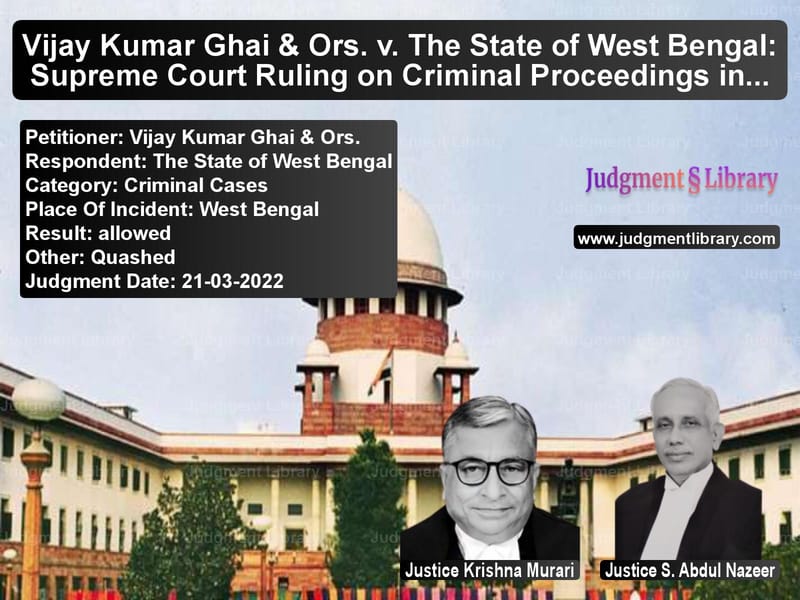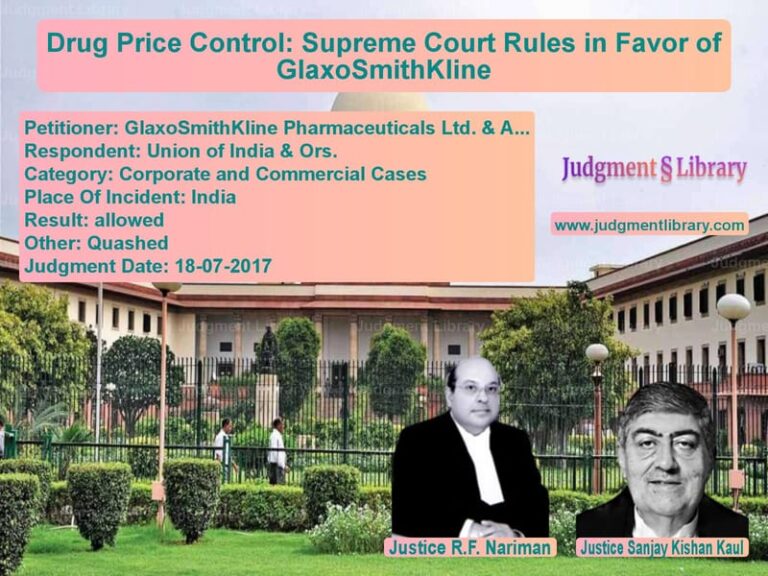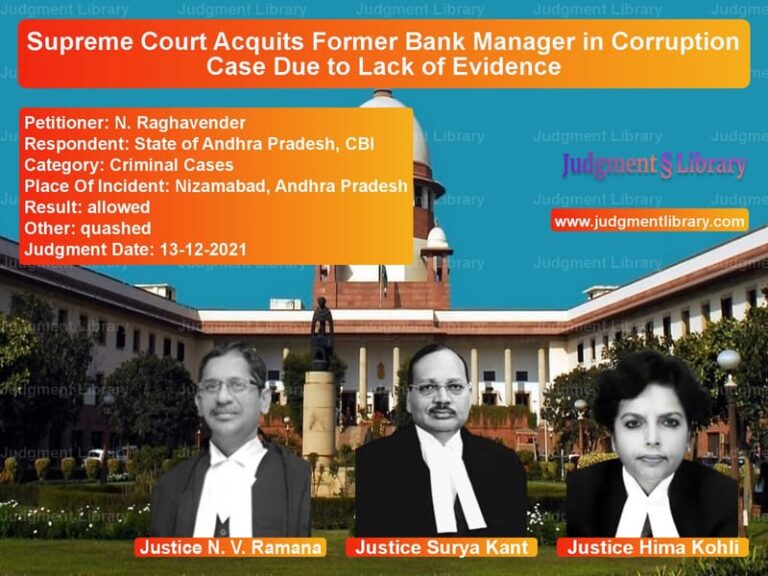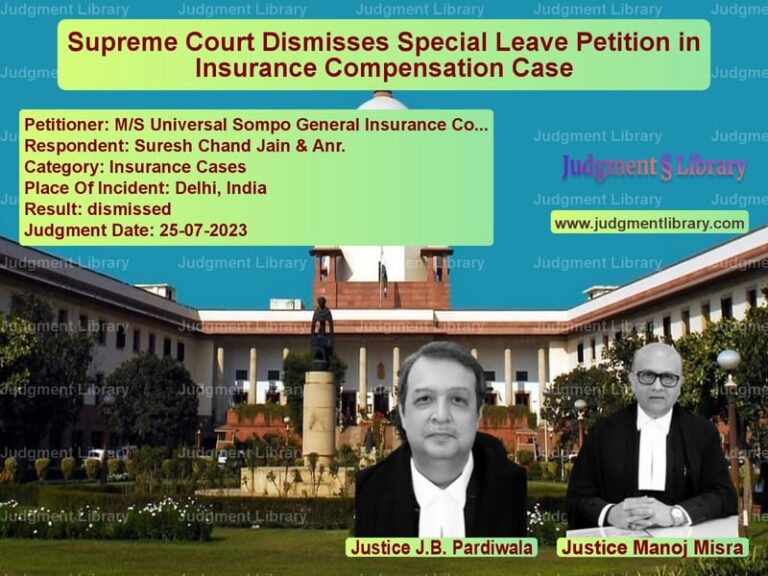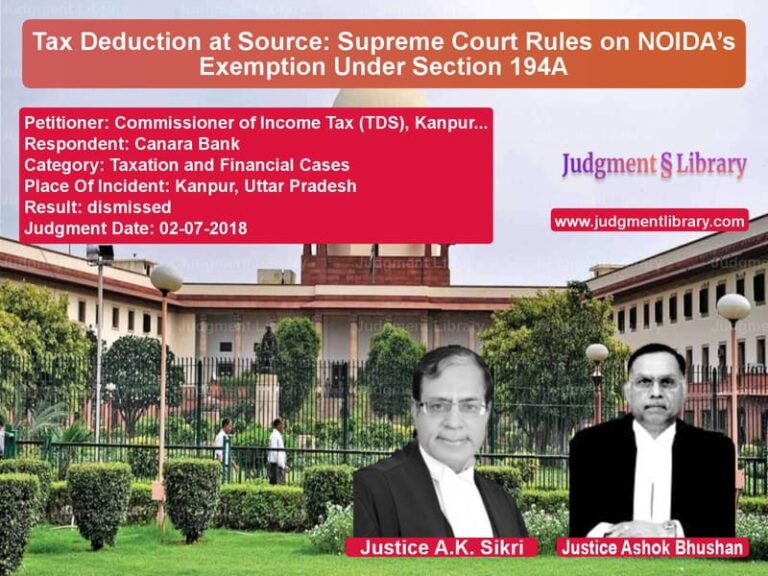Vijay Kumar Ghai & Ors. v. The State of West Bengal: Supreme Court Ruling on Criminal Proceedings in Civil Disputes
The Supreme Court recently delivered a significant judgment in the case of Vijay Kumar Ghai & Ors. vs. The State of West Bengal concerning the quashing of criminal proceedings under Sections 406, 420, 120B of the Indian Penal Code (IPC). The case revolved around allegations of cheating and criminal breach of trust arising from a commercial transaction between the parties. The Court examined the principles of forum shopping, the distinction between civil and criminal disputes, and the exercise of inherent powers under Section 482 of Cr.P.C.
Background of the Case
The dispute began when Respondent No. 2, an authorized representative of SMC Global Securities Ltd., invested Rs. 2.5 crore in the appellants’ company, Priknit Retails Limited (later renamed Priknit Apparels). In return, Respondent No. 2 was promised shares in the company, which were to be allotted to him after an initial public offering (IPO). However, due to the company’s failure to bring the IPO, Respondent No. 2 filed a police complaint accusing the appellants of fraudulent misrepresentation. The complaint was initially filed in Delhi but was later shifted to Kolkata, leading to the FIR under Sections 406, 420, and 120B IPC.
Despite a closure report filed by the police in Kolkata, Respondent No. 2 filed a protest petition, which was allowed by the Chief Metropolitan Magistrate (CMM) in Kolkata, directing further investigation. The appellants, however, challenged the proceedings by filing a quashing petition in the High Court of Calcutta.
The High Court dismissed the quashing petition, stating that the criminal proceedings did not amount to an abuse of the court’s process. Dissatisfied with this order, the appellants appealed to the Supreme Court.
Legal Issues Considered
- Whether the High Court erred in dismissing the quashing petition under Section 482 Cr.P.C..
- Whether the allegations in the FIR disclosed a cognizable offence under the IPC or were purely of a civil nature.
- The issue of forum shopping in filing multiple complaints in different jurisdictions.
- The scope of criminal prosecution in cases involving civil disputes.
Petitioner’s Arguments
- The appellants argued that the dispute was essentially a civil matter and did not involve any criminal offence.
- The complaint filed in Kolkata was identical to the one filed in Delhi, with the only difference being the change in jurisdiction. This amounted to forum shopping to harass the appellants.
- There was no dishonesty or fraudulent intention on the part of the appellants, and the allegations were based on breach of contract, not criminal misconduct.
- They cited several precedents where similar commercial disputes were deemed to be of civil nature and could not give rise to criminal prosecution for cheating.
Respondent’s Arguments
- The respondent argued that the allegations in the complaint disclosed offences under Sections 406, 420, and 120B IPC.
- The complaint filed in Kolkata was legitimate as it was filed after the Delhi Court rejected the earlier complaint.
- Even though the dispute was of a commercial nature, the specific allegations of inducement to invest under false pretenses amounted to cheating and criminal breach of trust.
- The respondent also cited various precedents where courts held that criminal proceedings could coexist with civil remedies if the allegations disclosed a prima facie criminal offence.
Supreme Court’s Judgment
The Supreme Court bench, comprising Justices Krishna Murari and S. Abdul Nazeer, ruled in favor of the appellants, quashing the FIR and the proceedings in Kolkata.
1. Allegations Did Not Disclose Criminal Offences
“The allegations made in the FIR and the complaint, even if taken at their face value, do not prima facie disclose an offence of cheating or criminal breach of trust under Sections 420, 406, and 120B IPC.”
The Court found that the allegations amounted to a breach of contract and did not meet the criteria for criminal cheating. It emphasized that a mere failure to fulfill contractual obligations cannot amount to criminal deception or misappropriation.
2. The Practice of Forum Shopping
“Respondent No. 2 engaged in forum shopping by filing two complaints based on the same cause of action in different jurisdictions, a practice that this Court has consistently condemned.”
The Court criticized the respondent’s actions in filing complaints in multiple jurisdictions and stated that such conduct was intended to harass the appellants.
3. Civil Dispute Misrepresented as Criminal Offence
“The dispute between the parties, involving the failure to honor contractual promises, does not constitute a criminal offence under the Indian Penal Code.”
The Court reiterated that criminal proceedings should not be initiated for purely civil disputes unless there is evidence of dishonest or fraudulent intent from the outset.
4. Quashing of the FIR and Proceedings
“The FIR and subsequent criminal proceedings are quashed, as no prima facie case for criminal offences under Sections 406, 420, or 120B IPC has been made out.”
The Court exercised its power under Section 482 Cr.P.C to quash the FIR and the proceedings, emphasizing that the allegations were of a civil nature and did not warrant criminal investigation.
Key Takeaways from the Judgment
- The Court made a clear distinction between civil disputes and criminal offences, highlighting that breach of contract does not automatically lead to criminal liability.
- Forum shopping was condemned as an abuse of legal process, and the Court ruled against multiple complaints being filed in different jurisdictions for the same cause of action.
- The judgment reinforced the principle that criminal proceedings should not be used to resolve civil disputes.
- Inherent powers under Section 482 Cr.P.C can be invoked to quash criminal proceedings when they are based on frivolous or vexatious allegations.
Implications of the Verdict
This ruling has significant implications for how courts handle criminal proceedings in commercial disputes:
- It sets a precedent that criminal prosecution should not be misused in contractual disputes where civil remedies are available.
- The judgment also underscores the need for judicial caution in cases involving forum shopping and the filing of multiple complaints in different courts.
- It is a reminder that courts must carefully assess whether allegations truly disclose criminal offences before allowing investigations to proceed.
Overall, this Supreme Court ruling ensures that criminal law is not used to bypass civil remedies and protects litigants from unnecessary harassment through multiple legal proceedings.
Petitioner Name: Vijay Kumar Ghai & Ors..Respondent Name: The State of West Bengal.Judgment By: Justice Krishna Murari, Justice S. Abdul Nazeer.Place Of Incident: West Bengal.Judgment Date: 21-03-2022.
Don’t miss out on the full details! Download the complete judgment in PDF format below and gain valuable insights instantly!
Download Judgment: vijay-kumar-ghai-&-o-vs-the-state-of-west-be-supreme-court-of-india-judgment-dated-21-03-2022.pdf
Directly Download Judgment: Directly download this Judgment
See all petitions in Murder Cases
See all petitions in Fraud and Forgery
See all petitions in Theft and Robbery Cases
See all petitions in Custodial Deaths and Police Misconduct
See all petitions in SC/ST Act Case
See all petitions in Judgment by Krishna Murari
See all petitions in Judgment by S. Abdul Nazeer
See all petitions in allowed
See all petitions in Quashed
See all petitions in supreme court of India judgments March 2022
See all petitions in 2022 judgments
See all posts in Criminal Cases Category
See all allowed petitions in Criminal Cases Category
See all Dismissed petitions in Criminal Cases Category
See all partially allowed petitions in Criminal Cases Category

